
Help from kelp
How ocean plants help our garden plants
By Marion Owen, Fearless Weeder
for PlanTea, Inc. and
Co-author of Chicken Soup for the Gardener's Soul
FEATURE ARTICLE:

Tom Hanks' "Power of Four" solution
More good stuff:
Who is Marion Owen?
FAQs about PlanTea
Search Marion's articles, tips and recipes
Why grow organic?
News and press releases
Read love letters
How to link to this site
Need a speaker?
How to contact Marion
Visiting Alaska?
Come to Kodiak Island!
Go to home page

Marion's UpBeet Gardener
Newsletter has been
replaced by Marion's blog
which you can find at:
www.marionowen.wordpress.com

The ocean is a beautiful place. Salt air, walking along the beach, body
surfing and picnics.
Beneath the waves, you'll find a world teeming with life. There are dolphins,
salmon, hermit crabs and kelp forests. It's the kelp that connects gardeners
to the sea...
For example, did you know that every natural element known to man exists
in the ocean? Or that seaweed, which concentrates these elements in its
tissues, in turn provides plants with more than 70 minerals, vitamins
and enzymes?
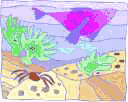
Though not all of these compounds are fully understood, many scientific studies have determined what gardeners and farmers have known for centuries: Seaweed, or kelp, is one of the most valuable soil conditioners in the world.
Why good soil is so-o-o important
You'll
want to share this bit of wisdom with all your friends: Healthy soil is
the 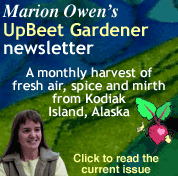 key to successful gardening. We're so focused on what happens
above the soil, we often forget that what's happening below the
soil's surface is a whole lot more than we realize.
key to successful gardening. We're so focused on what happens
above the soil, we often forget that what's happening below the
soil's surface is a whole lot more than we realize.
The best way to achieve healthy soil is to add organic materials. Nope,
sorry, chemical fertilizers do not promote healthy soil. They offer impressive
results by making plants look good, but that's only for the short term.
Studies confirm that in the long run they do much more harm that good.
Here's another way to put it: Feeding plants without concern the long term health of the soil is like building a house on sand. Thus, organic gardening practices are by far the best way to improve this critical part of your plants' living space.
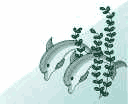
How ocean plants help earth plants
Seaweed, which originates from the ocean's garden, is one of the best materials for an earth garden. For one thing, kelp helps stimulates soil bacteria. This, in turn increases fertility of the soil by humus formation (which feeds on the bacteria), aeration and moisture retention. Let's look at some other ways that kelp helps:
- Seed germination is improved
- Fruits and vegetable have a greater nutritional value
- Plants develop more extensive root systems, which means healthier foliage, flowers and fruit
- Plants have a greater resistance to nematodes, disease and pests.
Where, oh where to find seaweed
If you live near the ocean, then you have it made. By the truckload or bucket, any amount of kelp is a bonus.
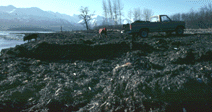
Kelp is loaded with minerals and nutrients. Recent studies show that kelp is one of the best materials you can feed your plants. Here, Kodiak, Alaska gardeners collect it by the truckload. (Marion Owen photo)
Seaweed also comes in a variety of commercial products, as a liquid kelp extract, as a dried kelp meal or blend. Kelp, for example, is the main ingredient in PlanTea, the patented, organic plant food in tea bags. After brewing a batch of PlanTea, you can use it as a concentrate or diluted as a foliar spray. Each 3 x 4-inch tea bag makes 5 gallons of foliar spray.

Each PlanTea tea bag is sealed in
oxygen-bleached
paper and measures 3x4 inches.
How to apply seaweed
You can apply fresh kelp directly to the soil (some people suggest rinsing it to remove the sea salt, but for the past 20 years I've never found it necessary). Arrange it as a 2 to 4-inch mulch layer or include it in the compost pile. Seaweed decays quickly because it contains little cellulose. What's nice too, is that you don't introduce weed seeds with seaweed mulch.
You can also apply kelp as a liquid fertilizer at the base of plants to reach the root zone, add it to a drip irrigation system or as a dilute foliar spray. In recent tests at Virginia Polytechnic Institute, soil sprayed with a seaweed solution had 67 percent to 175 percent more roots than untreated soil.
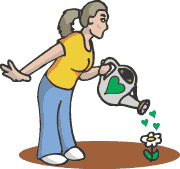
To make your own liquid kelp, add a couple handfuls of seaweed to a 5-gallon bucket of water. Stir the concoction daily for a few days, then strain and dilute it using the ratio of 1 part kelp liquid to 2 parts water.
Any sprayer or mister will work, from hand-trigger units to backpack models. The best times to spray are early morning and early evening, when the liquids will be absorbed most quickly. Spray the tops and bottoms of leaves until the liquid drips off the leaves.
Prevention is the best defense: use kelp
According to Rodale's All-New Encyclopedia of Organic Gardening (TIP: You can find inexpensive, used copies of this "indispensable resource for every gardener" are available through Amazon.com), sprays of seaweed extract can help prevent plant diseases. "They work by improving the overall health of the plant."
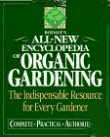
Such foliar sprays (liquid fertilizers sprayed on plants) are up to 20 times more effective as a way to supply nutrients when the soil is poor quality or when roots are stressed from transplant shock or suffering from extreme heat and drought conditions. Here, too, PlanTea is very effective in improving soil conditions and giving plants a helpful boost.
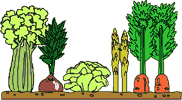
As people become more sensitive to environmental issues, the need for organic gardening methods plays a critical role in our health and the health of the planet. The use of kelp--a natural, renewable gift from the ocean--helps us with our efforts in the garden. What could be nicer?
Cheers!
![]()
Thanks for visiting and please stop by again. I'll put the coffee on!
Meet Marion Owen /// Learn about PlanTea /// Online Catalog /// Articles, Tips, Recipes /// Get free UpBeet Gardener newsletter /// Read current issue /// Listen to radio show /// Read news and press releases /// More resources and links /// Learn why 'grow organic?' /// View guidelines for retailers /// Read love letters /// Book Marion as a speaker /// Site map /// How to link to us /// Contact us /// Go to home page
PlanTea: The organic plant food in tea bags. http://www.plantea.com
Copyright ©1996 to present: PlanTea, Inc. All Rights Reserved. PO Box 1980, Kodiak, AK 99615-1980 USA
Questions or comments? marion@plantea.com Phone: Toll Free: 1-800-253-6331 (US and Canada); 907-486-2500